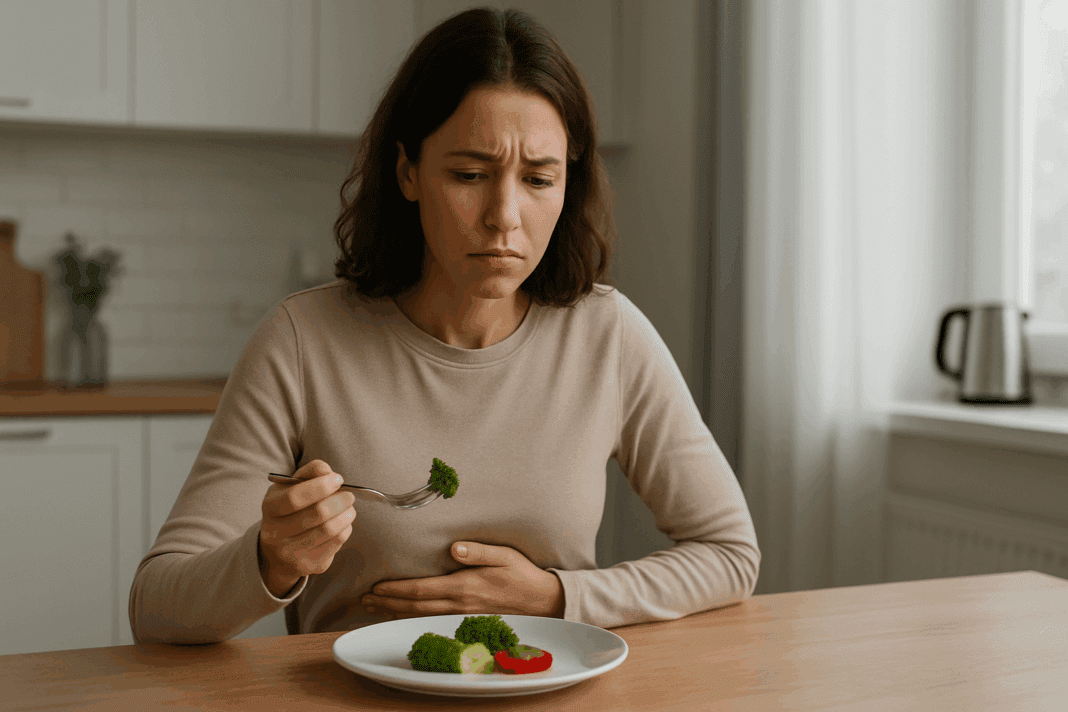Feeling unexpectedly full after just a few bites of food can be puzzling, especially when it becomes a persistent experience. Many individuals find themselves asking, “Why do I feel full so quickly?” or noting that they still feel full from lunch 6 hours ago. These sensations might seem trivial at first, but when they begin to disrupt daily life, they can raise important questions about one’s digestive health, nutritional intake, and even underlying medical conditions. Early satiety, the clinical term for feeling full faster than expected, is more than just an inconvenience—it may serve as a crucial signal from your body.
You may also like: How to Stop Emotional Eating and Regain Control: Mindful Nutrition Strategies That Support a Healthier Lifestyle
Although it’s normal to occasionally feel very full after eating, feeling full all the time or experiencing a tight stomach after small meals may indicate something more significant. Whether you’re dealing with a full stomach feeling without eating or wondering why your belly feels heavy even when your portions are small, understanding the underlying mechanisms is essential. In this comprehensive exploration, we will delve into the possible reasons behind feeling full quickly, from benign dietary habits to more serious gastrointestinal or metabolic conditions, while offering practical insights on how to manage these sensations.
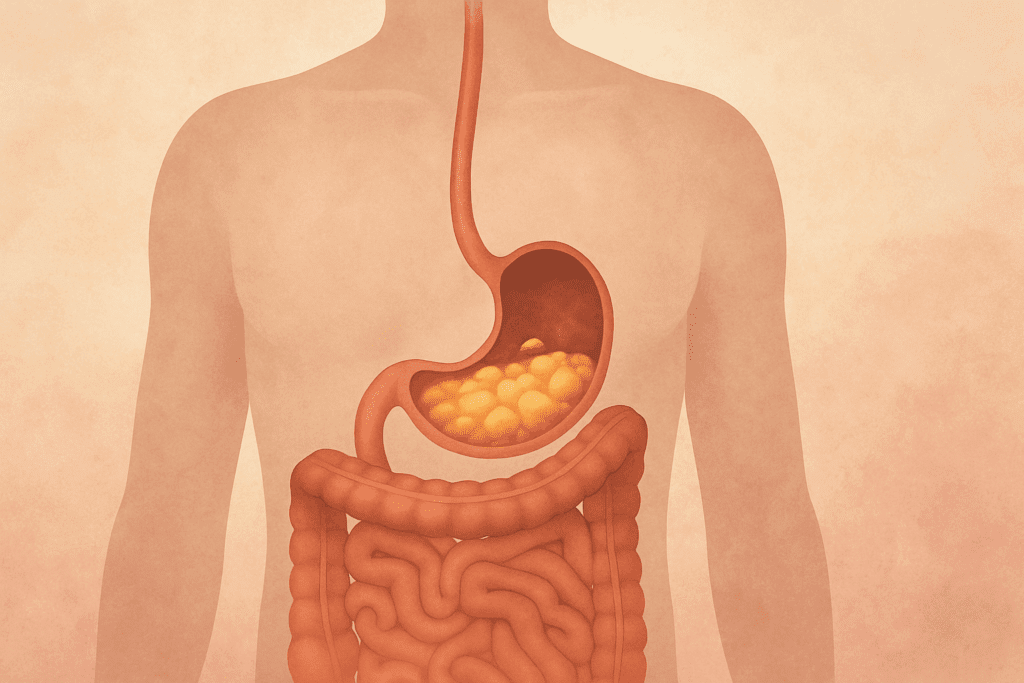
Decoding Early Satiety: When Feeling Full Too Fast Becomes a Pattern
For many people, the phrase “feeling full after eating small amount” describes a fleeting experience—perhaps tied to eating too quickly, stress, or a single indulgent meal. But when this pattern becomes a recurring event, it often leads to deeper questions. Why do I get full so easily? Why do I constantly feel full, even without eating much? These are not just casual concerns. They reflect a bodily response that may stem from issues such as delayed gastric emptying, gastrointestinal inflammation, or altered hunger signals.
Gastric emptying is a natural process where the stomach gradually transfers partially digested food into the small intestine. If this process slows down, as is the case with gastroparesis, one might feel full for hours after eating. Feeling full hours after eating, particularly when the meal was small, is a classic symptom of such delayed digestion. Additionally, factors like certain medications (such as GLP-1 agonists), stress, or inflammation can impair gastric motility.
Moreover, individuals using medications such as Ozempic for type 2 diabetes or weight management may encounter a similar phenomenon. It’s not uncommon for users to report that they still feel full from lunch 6 hours ago on Ozempic, highlighting how pharmaceutical interventions can modulate appetite and fullness sensations. Understanding whether this sensation is physiological, pharmacological, or pathological is key to addressing it appropriately.
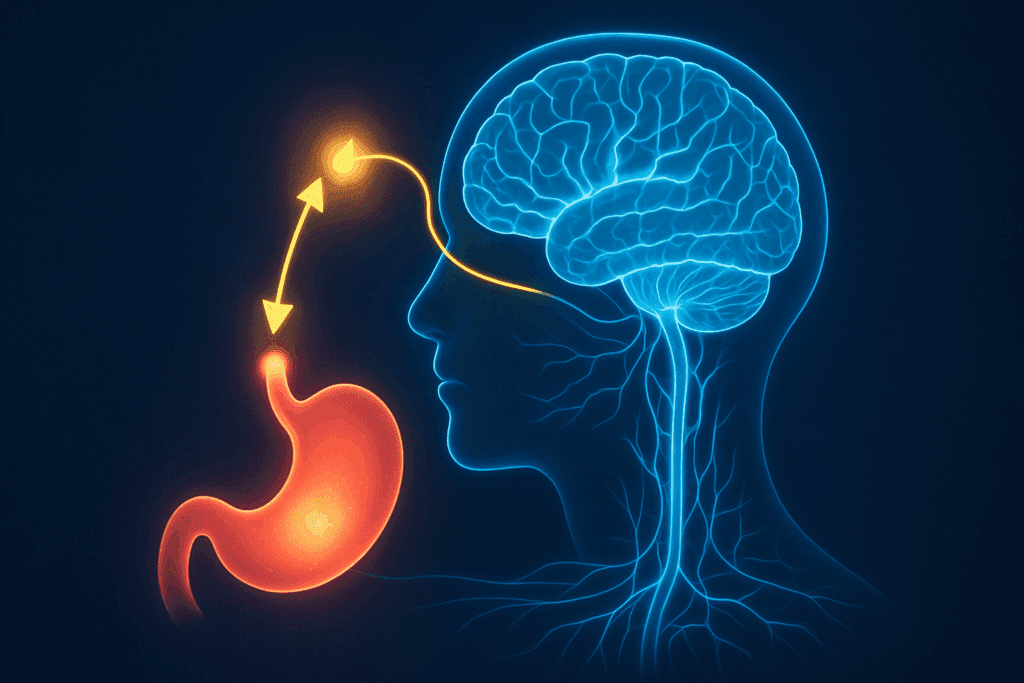
Gut-Brain Communication: How Signals Influence Appetite and Fullness
To truly understand why someone might feel full so fast, we must look beyond the stomach and explore the neurobiological mechanisms that regulate appetite. The gut and the brain maintain a continuous and complex dialogue through hormonal, neural, and biochemical pathways. Ghrelin, often called the hunger hormone, and leptin, the satiety hormone, play pivotal roles in this communication. An imbalance or misfiring in this system can make you feel full quickly, even when caloric needs haven’t been met.
Feeling full quickly isn’t always a sign of eating enough. For example, people who report that they feel full after eating a small amount often experience this due to hypersensitive stretch receptors in the stomach or dysregulation in hormonal signaling. These responses can be triggered by stress, certain medications, or metabolic changes. It’s crucial to distinguish between physiological satiety and pathological early satiety—the former being a natural part of digestion, and the latter potentially signaling an underlying health issue.
When this gut-brain feedback system goes awry, the result can be a persistent sensation of fullness that feels disproportionate to actual intake. This leads to common complaints such as feeling full fast, tummy feels heavy, or stomach feels bloated and tight. These are more than vague discomforts; they may point toward a malfunction in the body’s natural appetite regulation system that deserves careful medical evaluation.
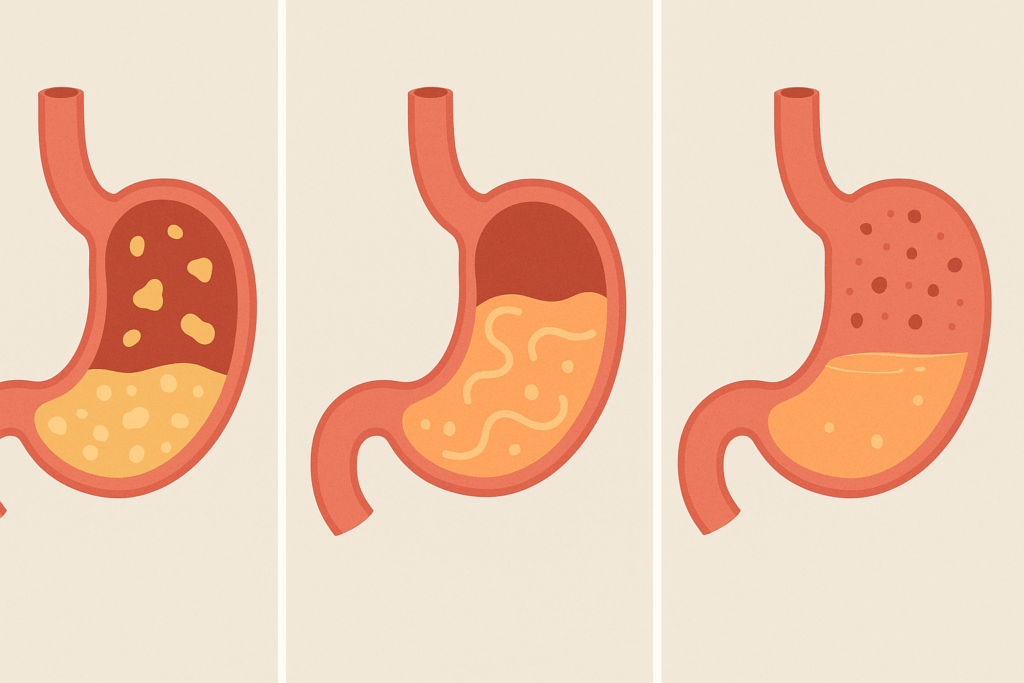
Digestive Disorders That Can Lead to Feeling Full All the Time
There are a variety of gastrointestinal conditions that can contribute to feeling full all the time. One of the most common is gastroparesis, a condition characterized by delayed stomach emptying without an actual blockage. It often presents as feeling very full after eating, nausea, bloating, and even unintentional weight loss. Diabetics, especially those with longstanding type 2 diabetes, are at increased risk due to vagus nerve damage.
Another condition worth noting is functional dyspepsia. This disorder, often categorized under the umbrella of “indigestion,” can result in upper abdominal discomfort, early satiety, and a heaviness feeling in the stomach. Individuals with functional dyspepsia often report that they are hungry but feel full after only a few bites, which can lead to reduced nutrient intake and fatigue over time.
Peptic ulcers, gastritis, and even more serious conditions such as stomach tumors can also manifest as early satiety. When patients express that they always feel full or that their tummy feels heavy and uncomfortable regardless of diet, these more concerning diagnoses must be ruled out. While not every case of feeling really full after eating is serious, persistent or worsening symptoms should prompt a consultation with a gastroenterologist.
The Role of Medications and Hormonal Changes in Appetite Regulation
Medications play a critical role in how the body processes hunger and fullness cues. In recent years, GLP-1 receptor agonists like Ozempic have gained attention for their ability to regulate blood sugar and promote weight loss by slowing gastric emptying. Many users report that they still feel full from lunch 6 hours ago on Ozempic, illustrating the drug’s potent effect on satiety mechanisms. While this can be beneficial for weight management, it may also lead to discomfort, reduced appetite, and inadequate nutrient intake if not carefully monitored.
Hormonal fluctuations, particularly those associated with thyroid disorders, polycystic ovary syndrome (PCOS), and menopause, can also affect hunger regulation. Individuals with hypothyroidism often ask, “Why do I feel so full after eating?” due to slower metabolism and digestion. Conversely, estrogen imbalances can lead to bloating and a tight stomach, even in the absence of large meals.
Cortisol, the stress hormone, is another influential player. Chronic stress can heighten gut sensitivity and slow down digestion, leading to complaints such as feeling full after eating a small amount or experiencing a full stomach feeling without eating. In such cases, addressing the underlying hormonal imbalances or stress-related factors can dramatically improve symptoms.
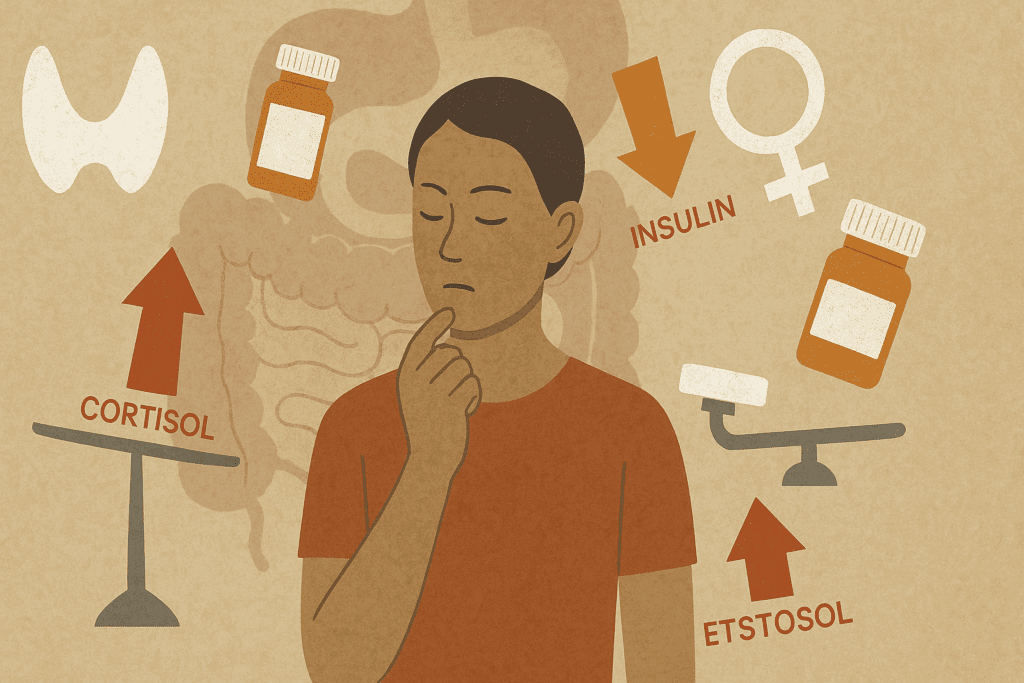
Psychological Factors That Influence Fullness and Appetite
While physiological and hormonal explanations are essential, the psychological dimension of appetite regulation should not be underestimated. Conditions like anxiety, depression, and eating disorders can significantly affect how full or hungry someone feels. People with high anxiety levels often report sensations like stomach feels bloated and tight or why does my belly feel heavy, even when objective intake is minimal.
Anorexia nervosa and other restrictive eating disorders can lead to physical changes in stomach capacity, resulting in early satiety. In these cases, individuals may feel full very quickly due to both physical and psychological factors. The repeated behavior of undereating conditions the body to accept smaller portions, while also reinforcing distorted beliefs about food and fullness.
Additionally, somatic symptom disorders may cause individuals to perceive gastrointestinal discomfort more intensely. When someone says they always feel full or that they are hungry but feel full simultaneously, it may reflect heightened interoceptive sensitivity—a deeper awareness of internal body sensations often amplified by mental health conditions.
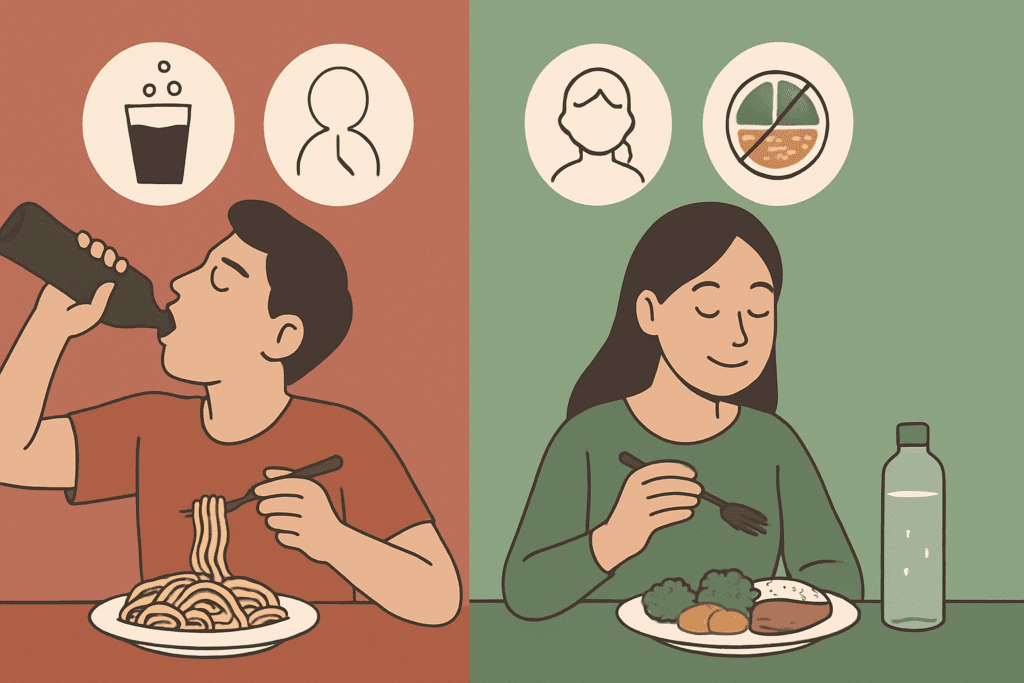
Nutritional Habits and Lifestyle Choices That Contribute to Feeling Full Too Fast
While it’s essential to rule out medical causes, lifestyle and dietary habits also play a crucial role in how full you feel. For instance, high-fiber meals, though beneficial for digestion, can lead to feeling very full after eating. Fiber expands in the stomach, triggering stretch receptors that signal fullness. While this is generally healthy, excessive fiber intake without adequate water can result in bloating and tightness in the abdomen.
Carbonated beverages are another contributor. The bubbles in these drinks can expand in the stomach, leading to sensations like why do I feel heavy in my stomach or why does my stomach feel heavy after eating even a small amount. Similarly, eating too quickly can disrupt the body’s natural fullness cues. When you eat fast, you may not give your brain enough time to register satiety, leading to discomfort shortly after.
Intermittent fasting or irregular eating schedules can also cause the digestive system to react unpredictably. If you delay meals for extended periods, your stomach may shrink slightly in volume, making you feel full quickly once you resume eating. This phenomenon can cause a pattern where people report that they feel full fast or that their tummy feels heavy despite eating relatively small meals.
When to Be Concerned: Identifying Red Flags and Seeking Medical Advice
Not every episode of early satiety warrants medical intervention. However, when the experience is persistent, worsening, or accompanied by other symptoms such as unexplained weight loss, vomiting, or anemia, it is essential to seek professional guidance. Feeling full all the time or experiencing a full stomach feeling without eating should not be ignored if it interferes with your ability to maintain a balanced diet.
Warning signs include consistent nausea, significant bloating, or a tight stomach that lasts beyond a few hours. If you find yourself asking why do I get full so fast and bloated or why do I feel so full consistently across meals, it might point toward a chronic digestive condition or metabolic imbalance that requires evaluation.
A comprehensive medical assessment may include endoscopy, imaging studies, gastric emptying tests, and blood work to rule out conditions such as gastroparesis, ulcers, or malignancies. Addressing these symptoms early can prevent complications such as malnutrition, fatigue, and decreased quality of life.

Managing Early Satiety: Practical Strategies for Everyday Wellness
For those experiencing frequent early satiety, a thoughtful and individualized approach to eating can offer significant relief. Small, nutrient-dense meals spaced throughout the day can provide adequate nutrition without overwhelming the digestive system. If you still feel full from lunch 6 hours ago, consider adjusting your portion sizes or eating more slowly to give your body time to process.
Hydration is another key factor. Drinking large amounts of water before or during meals can sometimes contribute to feeling full too quickly. Instead, spacing out fluid intake between meals may improve digestion. Paying attention to food textures and temperature can also help. Warm, soft foods are often easier to digest and less likely to trigger symptoms like a heaviness feeling in the stomach.
Mindful eating practices, such as chewing thoroughly and minimizing distractions during meals, can help reestablish the connection between hunger and fullness cues. If you find yourself asking why do I feel full so fast repeatedly, keeping a food and symptom journal may help identify patterns and triggers, allowing for more targeted interventions with the guidance of a healthcare provider or registered dietitian.
Frequently Asked Questions: Understanding Early Satiety and Unexplained Fullness
Why do I still feel full from lunch 6 hours ago while taking Ozempic?
Feeling full for extended periods after eating is a common experience for those using GLP-1 receptor agonists like Ozempic. These medications slow gastric emptying, which means food remains in your stomach longer than usual. While this is useful for managing blood sugar and promoting satiety, it can result in discomfort or persistent fullness, especially if your meal was high in fat or fiber. If you still feel full from lunch 6 hours ago on Ozempic, it may help to adjust meal composition and portion size. You might also consider discussing alternative dosing strategies or timing with your healthcare provider to minimize this side effect while maintaining therapeutic benefits.
What could it mean if I feel full after eating a small amount?
When you find yourself feeling full after eating a small amount, it might indicate that your stomach is not accommodating food normally. One possible explanation is visceral hypersensitivity, a condition in which the nerves in the digestive tract react too strongly to stretching. This sensation can also occur in people who experience psychological stress, particularly those with underlying anxiety disorders. If you consistently feel full quickly and without consuming much food, it may be worth exploring whether emotional stress, inflammatory responses, or even microbiome imbalances are contributing to your symptoms. Keeping a food and symptom diary can uncover overlooked triggers that exacerbate this response.
Is it normal to feel full all the time even if I haven’t eaten recently?
While occasional feelings of fullness are part of normal digestion, feeling full all the time without recent food intake could signal an issue with your gastrointestinal motility or hormone levels. For example, elevated leptin levels or imbalances in ghrelin signaling may falsely inform the brain that your body doesn’t need more food. In some cases, people who feel full all the time are experiencing low-grade inflammation in the gut or have developed food intolerances that lead to bloating and discomfort. If you’re concerned, a functional medicine approach involving hormone panels and food sensitivity testing might uncover the root causes. Additionally, conditions such as hypothyroidism or small intestinal bacterial overgrowth (SIBO) can also create a sense of persistent fullness.
Why do I get full so fast and feel bloated afterward?
Rapid fullness combined with bloating often points to a mismatch between digestion rate and food composition. For instance, meals high in fermentable carbohydrates (like onions, garlic, or beans) can produce gas and swelling, contributing to both feeling full quickly and experiencing abdominal distension. Another contributing factor could be air swallowing, known as aerophagia, which occurs during rapid eating or drinking carbonated beverages. If you’re wondering why you get full so fast and bloated afterward, it could be helpful to experiment with a low-FODMAP diet under professional supervision. This method identifies food triggers and helps reduce gastrointestinal discomfort while improving digestion efficiency.
Can psychological stress explain why I always feel full?
Absolutely. Chronic psychological stress can alter gut-brain signaling, suppress appetite, and slow down gastric motility, making you feel full fast even if your caloric intake is low. Stress activates the sympathetic nervous system, diverting blood away from the digestive tract and slowing the breakdown of food. Over time, this can lead to persistent feelings of satiety or a tight stomach, particularly after meals. People who always feel full often underestimate the impact of emotional stress and how it disrupts hormonal and neural digestion pathways. Incorporating stress-reducing practices like meditation, breathwork, or therapy may be an effective and sustainable way to address this symptom.
What should I do if I’m hungry but feel full at the same time?
Feeling simultaneously hungry but full is paradoxical and often reflects dysfunction in the body’s internal feedback systems. It may indicate that your stomach is sending stretch signals of fullness while your blood glucose and nutrient levels are low, triggering hunger. This disconnect is common in individuals with hormonal dysregulation, such as insulin resistance or polycystic ovary syndrome (PCOS). Addressing why you feel so full despite hunger may involve a detailed nutritional review and possibly endocrine evaluation. Tailoring your meals to include more protein and healthy fats may also help rebalance hunger and satiety cues over time.
Why does my stomach feel heavy even when I eat lightly?
A heaviness feeling in the stomach can be attributed to impaired digestive enzyme activity, sluggish gastric motility, or postprandial hypotension (a drop in blood pressure after eating). If you’re eating light meals yet consistently thinking, “Why does my stomach feel heavy?”, you might want to evaluate your intake of difficult-to-digest ingredients such as raw cruciferous vegetables or high-fat foods. Sometimes, supplementing with digestive enzymes or using bitter herbs like gentian or dandelion root before meals can stimulate digestion. Additionally, pacing your meals and chewing thoroughly can help reduce that heavy, weighted feeling.
Is a tight stomach after meals something to be concerned about?
Occasional tightness in the stomach post-meal is often a benign response to overeating or gas buildup. However, if you consistently experience a tight stomach or ask yourself, “Why do I feel full so fast and bloated?”, it could point to issues such as functional bloating, gastritis, or even food intolerance. Tightness may also be associated with abdominal wall tension due to stress or postural habits. Practicing diaphragmatic breathing and gentle abdominal massage can sometimes relieve the sensation, particularly if it’s caused by muscular tension. But if the tightness persists or worsens, consulting a healthcare provider is crucial to rule out underlying gastrointestinal or structural conditions.
How do I differentiate between normal fullness and signs of a health issue?
Understanding the difference between physiological satiety and abnormal fullness starts with context. Normal fullness should fade within 1-2 hours and not interfere with subsequent hunger or meal planning. On the other hand, if you frequently wonder why you constantly feel full or feel really full after eating even small meals, there might be a larger issue at play. Red flags include weight loss, nausea, early satiety, and fatigue following meals. In such cases, you might be dealing with conditions like gastroparesis or intestinal blockages, which require prompt medical attention and often diagnostic imaging to confirm.
Are there long-term consequences of always feeling full quickly?
Yes, feeling full quickly on a regular basis can have cascading effects on your health. For starters, inadequate nutrient intake can result in vitamin and mineral deficiencies, leading to fatigue, immune dysfunction, and even mental fog. Over time, individuals who always feel full may unintentionally restrict food to the point of malnutrition. This can affect muscle mass, cognitive performance, and hormone production. Addressing why you get full so easily isn’t just about comfort—it’s essential for maintaining long-term metabolic and physical health. A registered dietitian or integrative physician can help you strategize how to optimize your nutrition despite satiety challenges.
Conclusion: What Persistent Fullness Reveals About Your Digestive Health and When to Take Action
Feeling full quickly, especially when it happens frequently or without explanation, is not just a dietary annoyance—it may be a sign that something deeper is going on. Whether it’s tied to lifestyle habits, medications like Ozempic, or more complex gastrointestinal or hormonal conditions, the body’s signals should be respected and understood. Asking questions like why do I always feel full, why do I get full so easily, or why does my belly feel heavy can be the first step toward uncovering meaningful insights into your digestive health.
Persistent symptoms like feeling full after eating a small amount, feeling really full after eating, or even experiencing a full stomach feeling without eating should not be ignored. These experiences may impact your nutritional intake, energy levels, and overall quality of life. By understanding the root causes—whether mechanical, hormonal, neurological, or psychological—and seeking appropriate guidance, you empower yourself to manage your health with awareness and precision.
Ultimately, listening to your body and responding with informed, compassionate care is essential. If you constantly feel full or are hungry but feel full at the same time, consider this an invitation to tune in rather than push through. With the right support and strategies, it’s entirely possible to restore balance to your digestive system and reclaim your sense of comfort and well-being.
Was this article helpful? Don’t let it stop with you. Share it right now with someone who needs to see it—whether it’s a friend, a colleague, or your whole network. And if staying ahead on this topic matters to you, subscribe to this publication for the most up-to-date information. You’ll get the latest insights delivered straight to you—no searching, no missing out.

